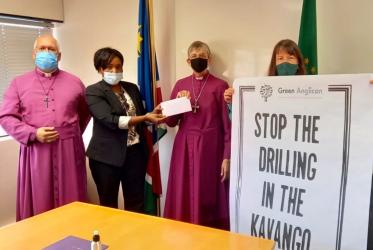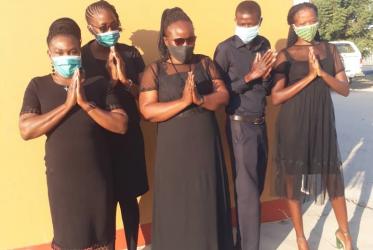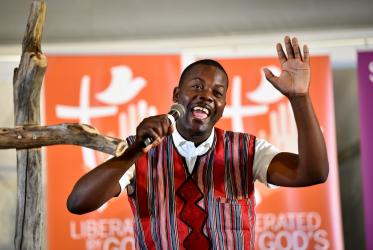Evangelical Lutheran Church in Namibia
The Evangelical Lutheran Church in Namibia grew out of the work which the Finnish Evangelical Lutheran Mission began in 1870 among the Ovambo and Kavango people, in the north of what became in 1884 German South West Africa. Formerly known as the Evangelical Lutheran Ovambokavango Church, the name was changed to ELCIN in 1984. Historically concentrated in the north, the church is now spreading to other parts of the country. In 1992 the ELCIN was divided into two dioceses, the Eastern diocese and the Western diocese, each led by a bishop.
The church runs a range of activities: a printing press, a public library, a rehabilitation centre, an institute for the training of deacons and lay preachers, a museum, two high schools, small community projects such as those for HIV prevention, nurseries, and a sewing workshop. The Lutheran Medical Services, under the supervision of the ELCIN, is running a wide spread of health and medical service programmes including primary health care and two large hospitals. Over 5000 staff and volunteers are working in these institutions. Theological training takes place at the United Lutheran Theological Seminary in Windhoek, jointly owned by the ELCIN and the Evangelical Lutheran Church in the Republic of Namibia. The ELCIN is a founding member of the Council of Churches in Namibia.
The ELCIN played a significant role in the resistance against the South African apartheid regime and in the struggle for liberation and independence. A name to be mentioned in this regard is former presiding bishop Dr Kleopas Dumeni. Because of its geographical location close to the border with Angola, the church found itself for many years in the middle of this war zone where the South African army opposed SWAPO.
In March 2007 the ELCIN, the Evangelical Lutheran Church in the Republic of Namibia (ELCRN) and the German-speaking Evangelical Lutheran Church in Naimibia (GELC) established the United Church Council of the Lutheran Churches in Namibia, with the ultimate aim to become one church.




